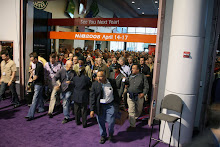Tuesday PM, Creative Storage Conference@NAB08
It's all about the meta-data, or at least mostly! I kind of feel like Dustin Hoffman in The Graduate when instead of whispering in my ear PLASTICS the buzz word was META-DATA. There was however a running theme through most of the Tuesday afternoon events that involved issues associated with digital ingest in general and meta-data in particular. It began with a keynote from Chris Hinton, Sr Director of Technology at CNN. Like all video news and TV operations they have a large library of linear tapes holding valuable content. Unlike many such holders of assets they hired a professional librarian early on did what such professional do and recorded important meta-card on paper library cards. Now as you might suspect CNN makes active use of their library but now that they are a digital shop there is a need to attack the backfiles of linear tapes and get them online and near-online in file formats. Given the scope and scale of assets at CNN hdqs in Atlanta, the nearly same total size in branches in major cities-- e.g: NY, London, DC, etc-- not to mention get again a comparable size in smaller bureaus; this is a big and expensive job. Trying to do the digital ingest and association of meta-data in a conventional manual matter could take hundreds of years and large $$$. Instead they decided to automate the ingest process and decouple ingest from meta-data association. Using multiple tape handling robots, they can load up the machines and let them run 24x7 doing the ingest and rely upon the library cards while they catch up latter to do a digital association by entering the hard copy meta-data into the computer.
The conference continued with much parallel discussion on the topic and picked up with an intense focus on the same area in a latter session with Michael Koetter of CNN and Jim Casabella of ABC/Disney. Michael reviewed and added some details to Chris's earlier keynote and when Jim's turn came to speak he said basically "ditto". The job was just too big to do in a conventional way. Both Michael and Jim revealed the difficulty in getting management to fund this massive ingest effort and lamented that while most local TV stations have the only local video history of their community, it is unlikely they will make the investments to ingest the tapes before they become unusable.
My take-away from this topic was that there is an unsolved problem here and perhaps this creates an opportunity for the application of new technology and methods that can provide a business opportunity for an innovative firm. Some ideas that come to mind are using image and sound fingerprinting technologies to automatically create content based addressable indexing to add to the electronically readable meta-data already on the tape (e.g. timecodes). Also perhaps to read and parse any text captioning on the tapes to add to the meta-data.
Wednesday, April 16, 2008
Subscribe to:
Post Comments (Atom)


No comments:
Post a Comment